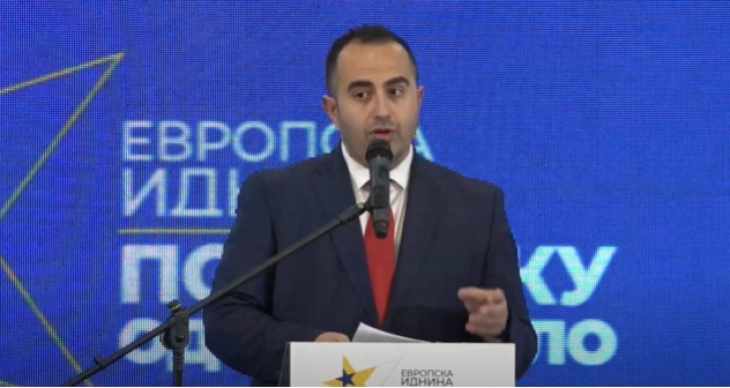Shaqiri: European education at home not only EU membership requirement, but need of pupils and students
- Addressing Wednesday's panel on improving quality of Macedonian education through EU integration, Education Minister Jeton Shaqiri said the need for European education at home is not only an EU membership requirement, but a real need of the pupils, students and all other stakeholders in the educational system.

Skopje, 17 January 2024 (MIA) – Addressing Wednesday's panel on improving quality of Macedonian education through EU integration, Education Minister Jeton Shaqiri said the need for European education at home is not only an EU membership requirement, but a real need of the pupils, students and all other stakeholders in the educational system.
The Minister believes that a highly integrated world should have highly integrated education.
"The only way to bring the quality of education at home closer to the desired standards is to approach a thorough reform. We started with primary education, consulting a number of stakeholders: teachers, professional and scholarly authorities, civil society, parents and students, and we arrived at the Concept for Primary Education. The World Bank stands behind it, as well as other relevant international organizations. We are implementing it step by step, through new curricula, investing in teaching staff training and improving infrastructure facilities," said Shaqiri.
He added that the goal is for students to acquire applicable knowledge, learn to think critically and solve problems.
According to him, secondary education, especially vocational education, is an extremely successful European-Macedonian story.
"With the help of several partner countries, particularly Switzerland and Germany, we are developing a model of dual education. Through targeted theoretical and practical education in a real production environment, high school students acquire usable knowledge, skills and abilities, and are in demand by domestic and international companies in the zones, although, with equal success, they can also continue with an academic education," Shaqiri pointed out.
As regards higher education, he said that the number of faculties with international accreditation that implement quality study programs is growing by the year.
"Our postulate in higher education is university autonomy and academic freedom. What we are aiming at in the higher education segment is additional encouragement of the processes that mean better opportunities for both teaching staff and students, through changes in the regulation and adoption of the New Law on Higher Education. Students, professors and scholars can use the wide possibilities of mobility through Erasmus Plus," said Shaqiri.
He added that current and future youth will have better prospects, which requires a unified contribution to EU membership.
Marko Gjorgievski, director of the National Agency for Educational Programs and Mobility, and
Gjorgi Tasev, Youth Advisor to the Prime Minister, also addressed the panel.
The event presented opportunities and perspectives for young people available through the European Union's programs for exchange and cooperation with European educational institutions. In addition, the attendees had the opportunity to receive more information about the potential benefits of EU membership in terms of improving the quality of Macedonian education, increasing the employability of young people, strengthening the dialogue on a variety of topics and helping to raise youth activism.
Фото: Принтскрин







